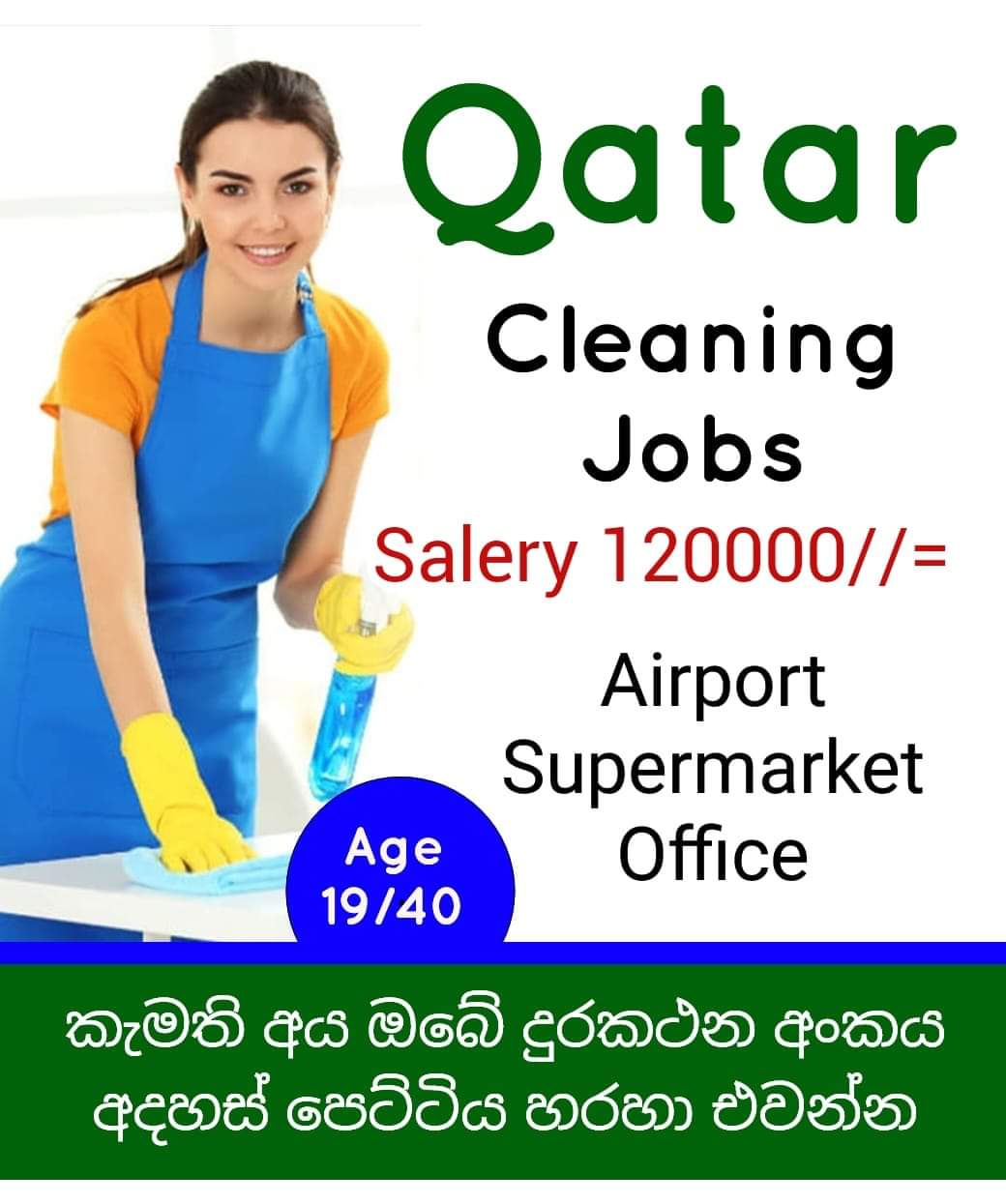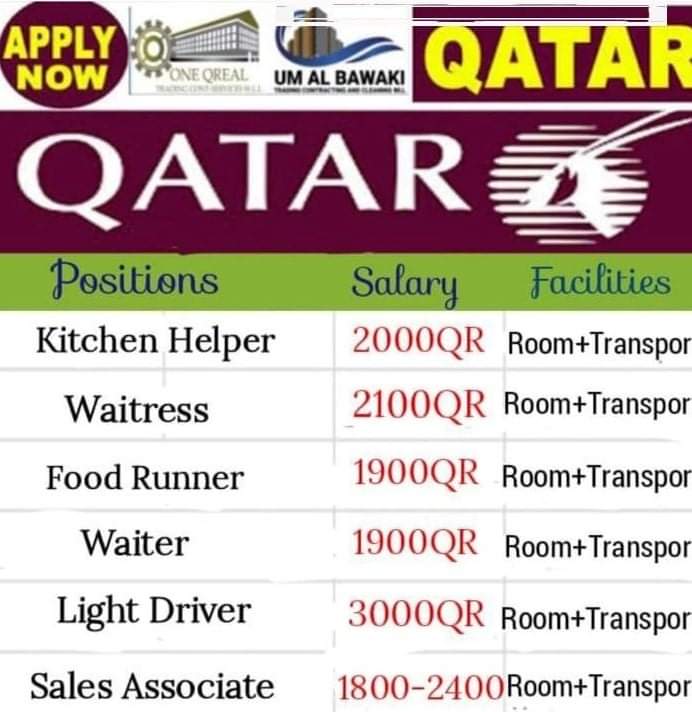Exciting Job Opportunities in Qatar!
Are you ready to take your career to new heights Qatar, a dynamic and thriving country, is offering numerous job opportunities across various industries. Whether you’re a seasoned professional or a fresh graduate, Qatar welcomes talented individuals from around the world. Here’s a step-by-step guide on how to apply for a job in Qatar, along with the full requirements:

1️⃣ Research and Identify Job Opportunities: Start by exploring the job market in Qatar. Look for reputable job portals, company websites, or consult with recruitment agencies that specialize in placements within Qatar. Make a list of potential employers and positions that align with your skills and experience.
2️⃣ Update Your Resume/CV: Polish your resume/CV to highlight your qualifications, work experience, skills, and achievements. Tailor it to match the requirements of the job you’re applying for. Ensure it is well-structured, error-free, and professional in appearance.
3️⃣ Prepare a Cover Letter: Craft a compelling cover letter that introduces yourself, expresses your interest in the position, and explains how your skills align with the job requirements. Customize the cover letter for each application.
4️⃣ Gather Required Documents: Prepare the following documents commonly required for job applications in Qatar:
- Valid Passport: Ensure your passport has a minimum of six months’ validity.
- Education Certificates: Include copies of your educational qualifications and degrees.
- Experience Certificates: Provide letters or documents confirming your previous work experience.
- Professional Certifications: Include any relevant certifications related to your field.
- Language Proficiency Certificates: If applicable, provide evidence of your proficiency in English or Arabic.
5️⃣ Obtain Necessary Work Permits and Visas: If you are applying from outside of Qatar, you will likely require a work permit or visa to work in the country. The sponsoring employer is typically responsible for obtaining these permits. Ensure you have a clear understanding of the visa requirements and process.
6️⃣ Apply Online or Directly to Employers: Submit your application online through job portals or company websites. Alternatively, you can directly reach out to potential employers by sending your application via email or through their designated application platforms. Follow the instructions provided on each application form.
7️⃣ Network and Attend Job Fairs: Utilize networking opportunities and attend job fairs or career events specific to Qatar. Connect with professionals in your field, join relevant online communities, and engage with local professional organizations.
8️⃣ Prepare for Interviews: If shortlisted, you may be invited for an interview. Research the company, practice common interview questions, and prepare thoughtful answers that demonstrate your skills and suitability for the role. Dress professionally and be punctual for your interview.
9️⃣ Follow Up: After submitting your application or attending an interview, follow up with a thank-you email or note to express your appreciation and reiterate your interest in the position.
Best of luck with your job search in Qatar!
Please note that specific job requirements may vary based on the industry, position, and employer. It’s essential to review each job posting carefully for any additional requirements or instructions provided by the employers.

When researching and identifying job opportunities in Qatar, consider the following steps:
- Explore Online Job Portals: Visit popular online job portals that cater to the Qatar job market. Some commonly used portals include Bayt, GulfTalent, Indeed, and LinkedIn. Use relevant keywords and filters to narrow down your search and find job listings that match your skills and interests.
- Company Websites: Check the websites of companies you are interested in working for. Many organizations in Qatar advertise job vacancies on their official websites. Look for their “Careers” or “Jobs” section, where they often provide details about available positions and application procedures.
- Recruitment Agencies: Connect with reputable recruitment agencies that specialize in Qatar job placements. These agencies often have access to exclusive job opportunities and can assist in matching your skills with relevant vacancies. Research and reach out to reputable agencies operating in Qatar.
- Networking: Leverage your professional network and connections. Let friends, colleagues, or industry contacts know that you are looking for job opportunities in Qatar. They may have valuable leads or be aware of vacancies in their organizations or within their network.
- Local Newspapers and Publications: Check local newspapers and publications in Qatar, both in print and online. They often feature job advertisements from various industries. Look for dedicated job sections or classifieds where employers post their vacancies.
- Professional Associations and Events: Join professional associations or industry-specific groups related to your field of expertise in Qatar. Attend networking events, conferences, and seminars. These platforms provide opportunities to connect with industry professionals, learn about job openings, and gain insights into the job market.
- Social Media Platforms: Utilize social media platforms, especially LinkedIn, to search for job opportunities in Qatar. Follow relevant companies, join professional groups, and engage with industry-related content. Some companies may post job openings directly on their social media pages.
Remember to regularly check for updates on the platforms you choose, as job postings can change or new opportunities may arise. Keep your job search focused and stay proactive by submitting applications and following up on leads. Good luck with your job search in Qatar!

When updating your resume/CV for job applications in Qatar, consider the following tips:
- Format and Structure: Ensure your resume/CV has a clean and professional appearance. Use a clear and legible font, maintain consistent formatting, and organize information in a logical manner. Use headings, bullet points, and subheadings to enhance readability.
- Personal Information: Include your full name, contact details (phone number, email address), and current location. You don’t need to provide personal details such as age or marital status unless specifically requested.
- Professional Summary/Objective: Write a concise professional summary or objective statement that highlights your skills, experience, and career goals. Tailor it to the specific job you are applying for, emphasizing how you can contribute to the employer’s needs.
- Work Experience: List your work experience in reverse chronological order, starting with the most recent position. Include the company name, job title, employment dates, and a brief description of your responsibilities and achievements in each role. Quantify your accomplishments whenever possible to showcase your impact.
- Education: Provide details of your educational background, including the institutions attended, degrees earned, and relevant certifications or diplomas. Include the dates of your academic achievements.
- Skills: Create a dedicated section to highlight your relevant skills. Include both hard skills (technical skills specific to your industry) and soft skills (such as communication, leadership, or problem-solving abilities). Tailor the skills section to align with the job requirements.
- Language Proficiency: Specify your proficiency in languages, particularly English and Arabic. Use common language proficiency descriptors (such as beginner, intermediate, advanced) or provide specific certifications if available.
- Additional Sections: Consider adding additional sections that enhance your profile, such as:
- Projects: Highlight relevant projects you have worked on, showcasing your contributions and outcomes.
- Professional Development: Include any relevant training programs, workshops, or conferences you have attended.
- Volunteer Experience: Mention any volunteer work that demonstrates your skills and commitment.
- Publications or Presentations: If applicable, list any publications or presentations related to your field.
- Keywords: Tailor your resume/CV to include keywords from the job description or industry-specific terms. This can help your resume/CV get noticed by applicant tracking systems (ATS) and potential employers.
- Proofread: Thoroughly proofread your resume/CV to ensure it is free from spelling or grammatical errors. Double-check dates, contact details, and the overall consistency of the document.
Remember, the specific requirements and preferences for resume/CV formats may vary among employers in Qatar. Adapt your resume/CV to align with the job posting and industry norms, while also showcasing your unique qualifications and experiences
When preparing a cover letter for job applications in Qatar, follow these guidelines to make a strong impression:
- Header: Include your name, contact information, and the date at the top of the letter. If possible, address the letter to a specific person, such as the hiring manager or recruiter. If you don’t have a specific name, use a professional salutation like “Dear Hiring Manager” or “Dear [Company Name] Recruiting Team.”
- Introduction: a. Begin with a professional and engaging opening paragraph that grabs the reader’s attention. Mention the specific position you are applying for and express your enthusiasm for the opportunity. b. State how you learned about the job opening, whether through a job portal, company website, referral, or any other source.
- Match Skills and Experience: a. Highlight your relevant skills, experiences, and qualifications that align with the requirements mentioned in the job posting. Demonstrate how your background makes you a strong fit for the position. b. Use specific examples to showcase your achievements or projects that demonstrate your abilities. Quantify your accomplishments whenever possible.
- Cultural Fit and Knowledge of Qatar: a. Emphasize your understanding of the local market and your interest in working in Qatar. Show that you are familiar with the country’s culture, values, and business environment. b. If you have prior experience in Qatar or the region, mention it and explain how it has prepared you for the role.
- Company Alignment: a. Research the company and identify its values, goals, and initiatives. Show how your skills and aspirations align with the company’s mission and vision. b. Mention any specific reasons why you are interested in working for the company, such as its reputation, projects, or industry leadership.
- Closing: a. Reiterate your interest in the position and express your enthusiasm to contribute to the company’s success. b. Thank the reader for considering your application and state that you are looking forward to the opportunity to discuss your qualifications further. c. End with a professional closing, such as “Sincerely” or “Best Regards,” followed by your full name.
- Formatting and Length: a. Keep the cover letter concise and focused, typically within one page. b. Use a professional font and maintain a clean and organized layout. c. Ensure there are no spelling or grammatical errors. Proofread carefully or consider seeking feedback from others.
Remember, the cover letter should complement your resume/CV and provide additional context about your qualifications and interest in the position. Customize each cover letter for the specific job application, addressing the needs and requirements of the company.
When applying for a job in Qatar, it is essential to gather the required documents to support your application. Here are the commonly requested documents:
- Passport: Ensure you have a valid passport with at least six months of validity remaining. Your passport will serve as your primary identification document.
- Resume/CV: Prepare an updated and tailored resume/CV highlighting your qualifications, work experience, skills, and education.
- Educational Certificates: Include copies of your educational qualifications, such as degrees, diplomas, or certificates. These documents validate your academic background and any specialized training you have received.
- Experience Certificates: Provide letters or documents from previous employers that verify your work experience. These certificates should include information about your job title, duration of employment, responsibilities, and achievements.
- Professional Certifications: If you hold any professional certifications or licenses relevant to your field, include copies of these documents. This demonstrates your expertise and commitment to professional development.
- Language Proficiency Certificates: If the job requires proficiency in specific languages, provide evidence of your language skills. This could include certificates or test scores from recognized language proficiency exams, such as IELTS or TOEFL for English or Arabic language exams.
- References: Prepare a list of professional references who can vouch for your skills and character. Include their names, job titles, contact information, and a brief description of your relationship with them.
- Passport-sized Photographs: Some employers may request recent passport-sized photographs for identification purposes. Follow the specific requirements for photo size and format, if applicable.
- Cover Letter: Include a copy of your tailored cover letter, which introduces yourself, expresses your interest in the position, and highlights your qualifications and motivations for applying.
- Additional Documents: Depending on the job and employer requirements, you may need to provide additional documents. These could include a copy of your portfolio, writing samples, work permits, or any other documentation relevant to the position.
Remember to make copies of all the documents you submit for your own records. It’s crucial to ensure that all the documents are clear, legible, and up to date.
Always review the job posting and any specific instructions provided by the employer to determine the exact documents required for your application. By gathering and organizing these documents in advance, you’ll be well-prepared to submit a comprehensive and complete application for your desired job in Qatar.
When applying for a job in Qatar, it is important to obtain the necessary work permits and visas to legally work and reside in the country. Here’s an overview of the typical process:
- Sponsorship: In Qatar, most job opportunities require sponsorship from an employer or company. This means that your employer will be responsible for initiating and facilitating the work permit and visa process on your behalf.
- Job Offer: Once you receive a job offer from a Qatari employer, they will guide you through the sponsorship process. Make sure to carefully review the terms of your employment contract before proceeding.
- Work Permit (Labor Card): Your employer will apply for a work permit, also known as a labor card, from the Ministry of Administrative Development, Labor, and Social Affairs (MADLSA) in Qatar. This permit allows you to legally work in the country.
- Medical Check-up: As part of the work permit application, you may be required to undergo a medical check-up at an authorized medical center in Qatar. This includes a general health examination and screening for infectious diseases.
- Visa Application: Once your work permit is approved, your employer will apply for a residence visa on your behalf. The visa will allow you to legally reside in Qatar and enter the country.
- Entry Visa: Before traveling to Qatar, you will typically receive an entry visa or visa authorization, which allows you to enter the country. This can be obtained through an online application or through the employer’s sponsorship process.
- Travel and Entry: Once you have the entry visa, you can travel to Qatar. Upon arrival, you will undergo immigration procedures at the airport, where your visa will be stamped, and you will be granted entry into the country.
- Residence Permit (RP): Within a specified period after your arrival, typically within a week, your employer will assist you in obtaining a residence permit, also known as an RP. The RP is an identification card that serves as evidence of your legal residence in Qatar.
It is important to note that the specific process and requirements for work permits and visas may vary depending on the nature of the job, your nationality, and the sponsoring employer. Your employer or the relevant government authorities in Qatar will provide guidance and assistance throughout the process.
It is recommended to start the visa and work permit application process as early as possible to allow for any potential delays or additional requirements. Keep in close communication with your employer to ensure a smooth and timely process.
Please consult with your employer or contact the relevant Qatari government agencies, such as the Ministry of Administrative Development, Labor, and Social Affairs, or the Ministry of Interior, for the most up-to-date and accurate information regarding work permits and visas in Qatar.
arewanahiya.com
